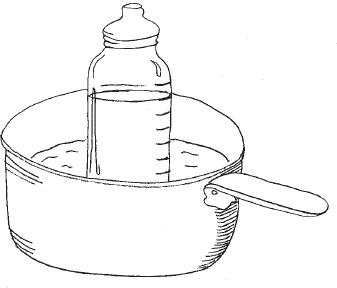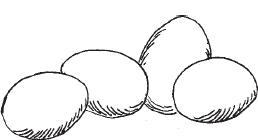Nourishing Traditions: The Cookbook That Challenges Politically Correct Nutrition and The... (164 page)
Authors: Sally Fallon,Pat Connolly,Phd. Mary G. Enig
Tags: #Non-Fiction, #Reference, #Science, #Health
Variation: Goat Milk Formula
Although goat milk is rich in fat, it must be used with caution in infant feeding as it lacks folic acid and is low in vitamin B
12
, both of which are essential to the growth and development of the infant. Inclusion of nutritional yeast to provide folic acid is essential. To compensate for low levels of vitamin B
12
, add
2 teaspoons organic raw chicken liver, frozen for 14 days, finely grated
to the batch of formula. Be sure to begin egg-yolk feeding at four months.
During the process of digestion, lactose breaks up into two other sugars, glucose (dextrose) and galactose. In myelin there is a large amount of galactolipids in the nature of phrenosin (cerebrosides) of various kinds. Cerebrosides are compounds found in the brain. Galactose is one of the constituents of this material. . .. Mother Nature must have intended that the young infant have this important substance, so amply provided for it in breast milk. . .. I have long held the opinion that the tremendous use of various [other] sugars in milk formulas over the years could be an important factor in the high percentage of mental and nervous breakdowns in our civilian population, not to mention the alarming numbers of such cases that have been reported in the military. The demyelination of the nerves is what makes the dread disease multiple sclerosis so crippling. This disease was quite rare in the days of breast-feeding. Emory W. Thurston, PhD
Nutrition for Tots to Teens
Alexander and Bullowa. . .observed that the casein of milk was an irreversible colloid and that it could be protected by the addition of a reversible colloid, such as gelatin. They pointed out, moreover, that woman's milk was higher in albumen or protective colloid than cow's milk and that the curd obtained from the coagulation of woman's milk was softer and more easily digested. When gelatin was added to cow's milk, a curd of equally desirable characteristics was formed. In addition, gelatin. . .served not only to emulsify the fat but also, by stabilizing the casein, improved the digestibility and absorption of the fat. . .. Experimental feeding tests show that milk containing gelatin is more rapidly and completely digested in the infant. N. R. Gotthoffer
Gelatin in Nutrition and Medicine
MEAT-BASED FORMULA
Makes 36 ounces
3¾ cups homemade
beef stock
or
chicken stock2 ounces organic liver, cut into small pieces
5 tablespoons lactose (See
Sources
)1 teaspoon bifodobacterium infantis (See
Sources
)¼ cup homemade liquid whey
Whey and Cream Cheese1 tablespoon coconut oil (See
Sources
)½ teaspoon high-vitamin or 1 teaspoon regular cod liver oil (see note on cod liver oil,
Superfoods
)1 teaspoon unrefined sunflower oil (See
Sources
)2 teaspoons extra virgin olive oil
¼ teaspoon acerola powder (See
Sources
)
Simmer liver gently in broth until the meat is cooked through. Liquefy using a handheld blender or in a food processor. When the liver broth has cooled, stir in remaining ingredients. Store in a very clean glass or stainless steel container. To serve, stir formula well and pour 6 to 8 ounces in a very clean glass bottle. Attach a clean nipple and set in a pan of simmering water until formula is warm but not hot to the touch, shake well and feed to baby. (Never heat formula in a microwave oven!) Note: It is very important to include the coconut oil in this formula as it is the recipe's only source of antimicrobial saturated fatty acids.
Milk-based commercial formulas are bad enough, but formula based on soy protein should never have been brought to market. This list of toxins in soy is a long one: phytic acid, which blocks absorption of minerals, especially zinc; protease inhibitors which block the digestion of protein; and high levels of aluminum, fluoride, MSG and manganese, all of which can have adverse effects on the brain and nervous system.
But it is the phytoestrogens or isoflavones in soy that give the most cause for concern. These compounds not only depress thyroid function, they also can have profound hormonal effects, especially at the levels to which the soy-fed infant is exposed. A recent study of infants fed soy formula found that they had concentrations of estrogen compounds at levels 13,000 to 22,000 times higher than infants on milk-based formula or breast milk. Infant boys go through a "testosterone tide" during the first six months of their lives, during which they normally have testosterone levels nearly equal to those of mature men. This early surge of male hormones programs the reproductive system, brain and other organs to take on male characteristics at puberty. Researchers are now wondering whether the feeding of estrogen-rich soy formula to infant boys interferes with this process and is a partial explanation for the increase in learning disabilities and maturation problems in boys. Soy infant feeding may also explain why so many girls are developing breasts and other sexual characteristics before the age of eight years old.
Anecdotal reports of other adverse effects include extreme emotional behavior, learning difficulties, immune system problems, irritable bowel syndrome and depression. SWF

FORTIFIED COMMERCIAL FORMULA
Makes about 35 ounces
1 cup Mead Johnson low-iron, milk-based powdered formula
29 ounces filtered water (3
5
/
8
cups)1 large
egg yolk
from an organic egg, cooked 3 ½ minutes½ teaspoon high-vitamin or 1 teaspoon regular cod liver oil (see note on cod liver oil,
Superfoods
)
This stopgap formula can be used in emergencies, or when the ingredients for homemade formula are unavailable. Place all ingredients in a blender or food processor and blend thoroughly. Place 6-8 ounces in a very clean glass bottle. (Store the rest in a very clean glass jar in the refrigerator for the next feedings.) Attach a clean nipple to the bottle and set in a pan of simmering water to heat gently. (Never,
never
heat formula in a microwave oven!)
Both gelatin and [lactic] acid when added to cow's milk seem to make the milk more digestible to the ordinary infant. This is evidenced by the fact that both vomiting and constipation appeared to be reduced when either of these substances was added, and a better rate of gain was made on the low curd tension milks. Similarly, it was noted that a much smaller percentage of the children developed diarrhea on the modified milks than on the unaltered cow's milk. Attention is called to the lower incidence of upper respiratory infections in the gelatin milk group. N. R Gotthoffer
Gelatin in Nutrition and Medicine
It is a remarkable fact that the young of most, including man, have weak digestive fluids; particularly do they have low amylase content in the saliva. The suckling animal or infant does not need to secrete a great quantity of enzymes because milk, its first food, does not demand so many of them for its digestion as it has quite a complement of its own enzymes. Edward Howell, MD
Food Enzymes for Health and Longevity
DIGESTIVE TEA FOR BABY
about 2 cups fresh anise leaves
about 2 cups fresh mint leaves
2 quarts filtered water
This is a folk remedy for treating constipation and intestinal gas in infants.
Bring water to a boil and pour over the herbs. Let steep until water cools. Strain. Give tepid tea to baby, about 4 ounces at a time.
Note: When a nursing mother drinks this tea, she passes along the benefits to her colicky baby!
Soy-based infant formula may adversely affect hormonal development in neonatal infants and should not be sold commercially. Soya is the richest dietary source of phytoestrogens, a plant form of the female hormone estrogen. Neonatal infants are particularly vulnerable to estrogens and insufficient research on the long-term health effects of phytoestrogens warrants a ban on the nonprescription sale of soy formula.
New Zealand Medical Journal
EGG YOLK FOR BABY
1 organic high-omega-3 egg or egg from a pasture-fed hen
pinch sea salt
½ teaspoon grated raw organic liver, frozen for 14 days (optional)
Boil egg for 3 ½ minutes. Place in a bowl and peel off shell. Remove egg white and discard. Yolk should be soft and warm, not hot, with its enzyme content intact. Sprinkle with a pinch of salt.
If you wish to add liver, grate on the small holes of a grater while frozen. Allow to warm up and stir into egg yolk.
Many cultures recognize that eggs are a brain food and encourage pregnant and nursing mothers to eat as many as possible. In China, nursing mothers who can afford it eat up to ten eggs per day!
Unfortunately, most commercial eggs available in the supermarkets are inferior, nutritionally speaking, to the eggs from free-range hens of yesteryear. The typical supermarket egg from battery hens given grain feed contains nineteen times more omega-6 fatty acids than omega-3 fatty acids.
Studies have shown that hens fed flax meal or fish meal rich in omega-3 fatty acids have equal amounts of omega-6 and omega-3, a very beneficial balance. Eggs from hens allowed to eat bugs and graze on green pasture would also have this favorable balance. In addition, these eggs are richer in certain special long-chain fatty acids needed for the optimal mental development of the infant's brain, nervous system and visual acuity. These fatty acids include arachidonic acid (AA), eicosapentaenoic acid (EPA) and docosahexaenoic acid (DHA). Many researchers, most notably the eminent Dr. David Horrobin, have warned that adequate EPA and DHA in the diet of infants is needed to prevent learning disabilities and defects in visual function.
Egg yolks also provide cholesterol needed for the optimal development of the nervous system.
So do not hesitate to give your infant his or her daily egg yolk, starting at four months. It is the yolk that contains the beneficial fatty acids. The proteins in the white of the egg may be difficult to digest until baby is older. SWF

CEREAL GRUEL FOR BABY
Makes 2 cups
½ cup freshly ground organic flour of spelt, kamut, rye, barley or oats
2 cups warm filtered water plus 2 tablespoons
whey
,
yoghurt
,
kefir
or
buttermilk¼ teaspoon sea salt